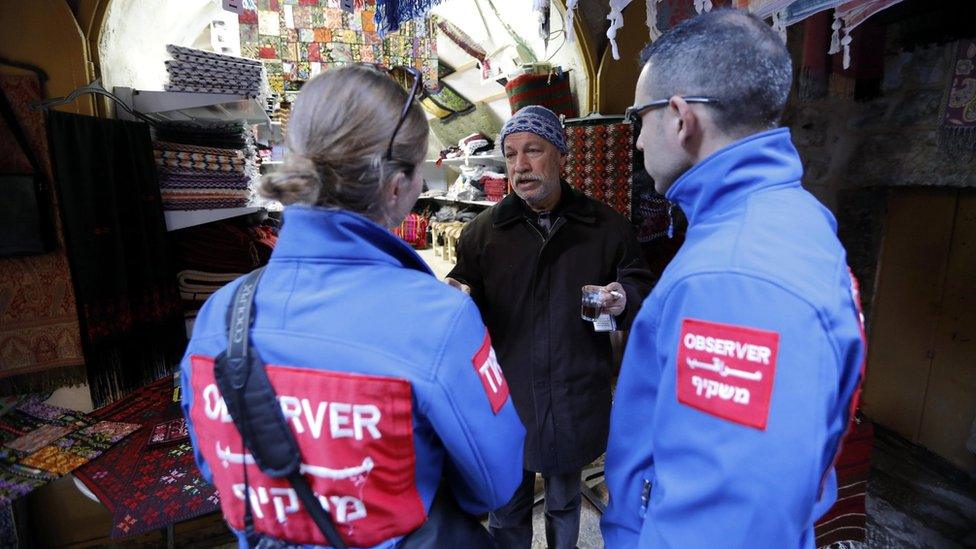Hebron: Palestinians denounce Israeli decision to end observer mission
- Published

Several European countries contribute civilian observers for the TIPH
The Palestinian Authority has condemned Israel's decision not to renew the mandate of a foreign observer force in the divided West Bank city of Hebron.
The Temporary International Presence in Hebron (TIPH) has deployed unarmed civilians for more than 20 years to report on human rights violations.
But Israeli Prime Minister Benjamin Netanyahu accused the observers of "acting against" his country.
Palestinians said Israel was showing contempt for international agreements.
Saeb Erekat, of the Palestine Liberation Organisation, called on the UN to deploy a permanent international force across the occupied West Bank in response.
Hebron has been a flashpoint for decades.
The city is the location of the Tomb of the Patriarchs/Ibrahimi Mosque, which is revered by Jews, Muslim and Christians as Abraham, Isaac and Jacob's burial place. The site is the second holiest in Judaism and the fourth holiest in Islam.
Under a 1997 agreement, 80% of Hebron is under the full control of the Palestinian Authority and the other 20% is under full Israeli control.
The Israeli-controlled sector is home to about 40,000 Palestinians and several hundred Jewish settlers living in settlement compounds. The presence of the settlers there is considered illegal under international law, although Israel disagrees with this.
The TIPH was established in 1994, external after an attack by a settler at the Ibrahimi Mosque that left 29 Palestinians dead. The force was deployed for three months but its mandate was not extended.
The 1997 agreement saw the TIPH return to Hebron, with Denmark, Norway, Italy, Sweden, Switzerland and Turkey contributing observers.
Its mission is to assist in "monitoring and reporting efforts to maintain normal life in the city of Hebron, thus creating a sense of security among the Palestinians".
The TIPH presents its findings to Israel and the Palestinian Authority, both of which are required to agree every six months to extend the force's mandate.
The TIPH declined to comment on the Israeli government's decision
On Monday, Mr Netanyahu's office announced it would not extend the mandate.
"We will not allow the continuation of an international force that acts against us," it said, without providing any further details.
Israeli Deputy Foreign Minister Tzipi Hotovely congratulated him on the decision and posted a video from a visit to Hebron in November in which she said settlers had told her that the TIPH "interferes", "systematically chooses to be one-sided", and "harms Israeli soldiers by documenting routine security assignments".
The TIPH declined to comment on the Israeli decision. But Norway, which co-ordinates the mission, warned that it might "imply the implementation of an important part of the Oslo accords is suspended".
"The situation in Hebron is unstable. TIPH's presence in the city has helped prevent violence and created a feeling of security in an area characterized by tension and conflict, therefore, the closing of TIPH gives reason for concern," Foreign Minister Ine Eriksen Soreide said.
On Tuesday, the Palestinian foreign ministry accused the Israeli government of aiming to "cover up grave, systematic, and escalating violations committed by the illegal Israeli colonial occupation and terrorist settler groups on daily basis against the Palestinian citizens in Hebron as well as to strip them of any protection".
Hebron and its surrounding area have also seen attacks by Palestinians against Israeli settlers and soldiers.
The UN said it regretted Israel's decision, external because of the TIPH's "role in contributing positively to defusing tensions in such a sensitive area".
Earlier, the UN Office of the High Commissioner for Human Rights expressed deep concern about an unrelated incident in the West Bank village of al-Mughayyir on Saturday, external in which a Palestinian man was shot in the back and killed.
The UN expressed concern over the killing of a Palestinian man in the West Bank on Saturday
OHCHR spokesman Rupert Colville told reporters in Geneva that its monitoring suggested Hamdi Taleb Naasan had died after a group of up to 30 Israelis from the nearby Israeli settler outpost of Adei Ad attacked Palestinian farmers in their fields and then fired live ammunition towards al-Mughayyir.
The confrontation led to six villagers being shot with live rounds, leaving three of them in a serious condition, he said, adding that it was unclear whether any settlers were also injured.
"When Israeli security forces did finally intervene, the main focus of their action appears to have been to disperse the Palestinian villagers using tear gas," Mr Colville said.
"Three more Palestinians were injured by live ammunition after the intervention of the security forces. However it is not clear at this point whether they were shot by settlers or by soldiers."
The Israeli military, which has opened an investigation, has said its troops only used riot control measures and that the settlers fired the live rounds.
The settlers have said the troops also used live ammunition, external, and that the confrontation began when a teenager was attacked and stabbed by Palestinians on the outskirts of al-Mughayyir.
According to the settlers, armed civilian emergency responders who came to the teenager's aid opened fire in self-defence after villagers threw stones at them.